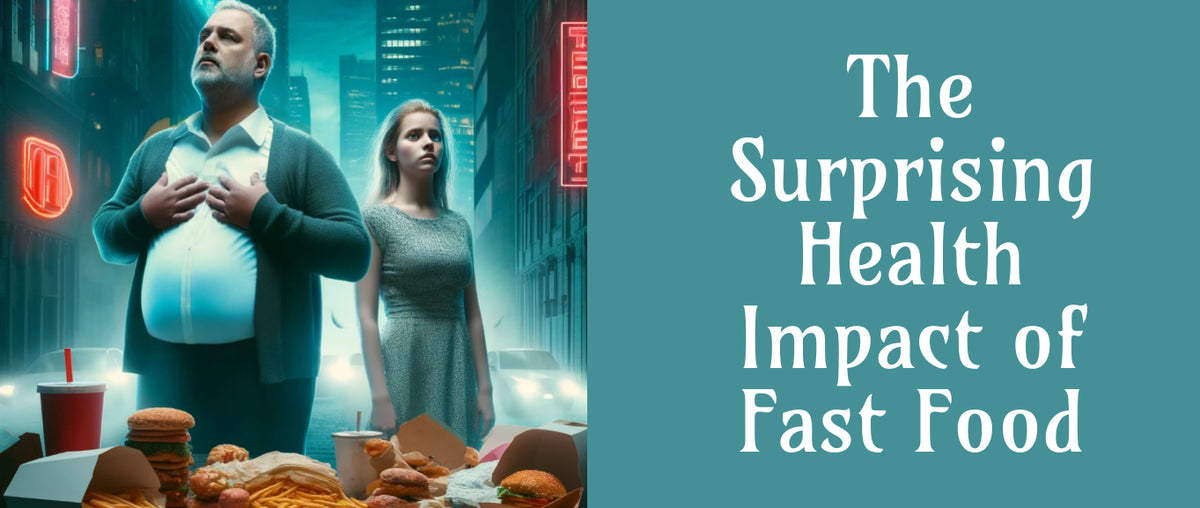The Impact of Fast Food on Health
In recent years, fast food has become synonymous with modern eating habits, with its convenience and accessibility overshadowing its health implications. As more individuals lean towards quick meal solutions, it's crucial to understand how these dietary choices affect our overall health and well-being. A growing body of research suggests that although fast food offers convenience, its impact on health can be significant, influencing everything from our digestive system to our mental health.
Impact of Fast Food on Health: The overall influence of regularly consuming fast food on our body, including digestion, weight, heart health, mental well-being, and more.
What is Junk Food?
Junk food refers to food items with little nutritional value, often high in calories, fats, sugars, and salts. These foods typically include mass-produced snacks, sweets, and fast food meals. Despite its appealing taste, junk food lacks essential nutrients like proteins, vitamins, and minerals which are vital for health.
Short-term Impacts of Fast Food
Consuming fast food can lead to immediate physiological changes and discomfort. Here are some of the short-term effects:
- Increased Blood Sugar Levels: Fast food rich in simple carbohydrates can cause a rapid spike in blood glucose, leading to energy peaks and crashes.
- Digestive Issues: High-fat content can slow down the digestive process, causing acid reflux and bloating.
- Mood Fluctuations: The quick spikes in blood sugar can also affect mood, leading to irritability and fatigue once the initial energy burst has subsided.
Long-term Impacts of Fast Food
The prolonged consumption of fast food can have severe health implications:
- Obesity: Regular intake of high-calorie fast food can lead to excessive weight gain and obesity, a major risk factor for cardiovascular diseases, diabetes, and other health issues.
- Chronic Diseases: Continuous exposure to high levels of fats and sugars increases the risk of developing chronic conditions such as type 2 diabetes, heart diseases, and certain cancers.
- Decreased Life Expectancy: Long-term health complications from sustained fast food consumption can also contribute to a shortened lifespan.
The Popularity of Fast Food
The global popularity of fast food is undeniable, driven by its affordability and speed. As lifestyles become busier, the allure of quick, cost-effective meals grows stronger. This trend is reflected in the increased consumption rates across various demographics, from busy professionals to younger populations. However, this rise in fast food consumption also aligns with escalating health concerns, highlighting a critical need for healthy eating practices.
Fast food chains have begun to respond to consumer demand for healthier options by incorporating plant based foods like Vegan Cheese and vegan butter , as well as offering Healthy Snacks for Kids. These menu additions are not just catering to dietary preferences but are also part of a broader shift towards a more healthy diet.
In recent years, innovations in the fast food industry, such as the introduction of Kombucha in India and Healthy Drinks on menus, reflect a more health-conscious consumer base. The addition of cashew butter and unsalted butter options also indicates a move towards ingredients that support muscle recovery and weight loss.

The Nutritional Profile of Fast Food
Fast food is often criticized for its poor nutritional quality. High in calories, saturated fats, and sodium, fast food can contribute to a variety of health issues if consumed regularly. Despite this, many fast food chains are making strides to offer better choices. Kombucha, a fermented tea known for its health benefits, and Healthy Drinks are becoming more common in these settings. Additionally, options like vegan shop items and garlic butter instead of traditional condiments are being introduced to cater to health-conscious consumers.
Effects on Physical Health
Effect on the Digestive System
Regular consumption of fast food can lead to various digestive problems, including increased acidity and indigestion. The high fat and sugar content can overpower the digestive tract, causing discomfort and more serious conditions like gastroesophageal reflux disease (GERD) and irritable bowel syndrome (IBS).
Effect on the Cardiovascular System
The cardiovascular system is significantly impacted by the high sodium and bad cholesterol levels found in most fast food. These elements can lead to elevated blood pressure, a higher risk of heart disease, and other serious health complications.
Effect on the Respiratory System
Studies have shown a correlation between heavy fast food consumption and a higher incidence of respiratory problems, such as asthma. The high calorie intake can lead to obesity, which often exacerbates conditions like obstructive sleep apnea.
Effect on the Central Nervous System
Fast food can have immediate effects on the central nervous system, causing spikes in blood sugar levels that might initially increase alertness but eventually lead to fatigue and irritability. Long-term, poor diet quality is associated with cognitive decline.
Effect on the Integumentary System (Skin, Hair, and Nails)
The health of your skin, hair, and nails can be adversely affected by what you eat. Fast food, lacking in essential nutrients like vitamins and minerals, can lead to dull skin, brittle nails, and unhealthy hair.
Effect on the Skeletal System (Bones)
A diet high in phosphates, commonly found in sodas and processed foods typical of fast food, can interfere with the body’s ability to absorb calcium. This can lead to weaker bones and conditions like osteoporosis, especially if combined with a lack of physical activity.
Also Read
Effects on Mental Health
The relationship between diet and mental health is increasingly recognized by the medical community. Frequent consumption of fast food, characterized by high levels of sugar and unhealthy fats, can exacerbate mental health issues. Studies suggest that a diet low in nutrients and high in processed foods may contribute to depression, anxiety, and decreased stress tolerance. Introducing healthier alternatives, such as plant-based foods and vegan products, can help enhance mental well-being by providing essential nutrients that support brain function.
Effects of Fast Food on Society
The widespread consumption of fast food has broader societal implications beyond individual health concerns. Economically, the healthcare systems bear significant costs treating diseases linked to poor dietary choices. Environmentally, fast food production contributes to larger carbon footprints and waste. Socially, there is a growing divide between those who have access to healthy, affordable food options and those who do not. Promoting a shift towards a more sustainable and health-conscious food industry could mitigate these effects, fostering a healthier society overall.
Conclusion
The effects of fast food on individual and societal health are profound and multifaceted. Recognizing these impacts is crucial as we move towards fostering environments that promote healthier food choices. Encouraging the integration of nutritious options like vegan butter and cashew butter in fast food menus can drive a positive change in dietary habits. By choosing healthier alternatives and supporting food industry innovations, we can improve not only our health but also the well-being of our communities.
Craving a delicious vegan meal? Look no further! We've got a guide to the best vegan restaurants in India, ready to help you discover amazing plant-based eats in your city.










